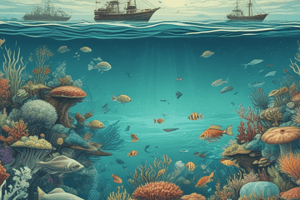Podcast
Questions and Answers
What is the average salt concentration in saltwater ecosystems?
What is the average salt concentration in saltwater ecosystems?
- 5.5%
- 1.5%
- 3.5% (correct)
- 7.5%
Which component of saltwater ecosystems is responsible for primary production?
Which component of saltwater ecosystems is responsible for primary production?
- Microorganisms
- Phytoplankton (correct)
- Zooplankton
- Marine animals
What is the process by which microorganisms break down organic matter?
What is the process by which microorganisms break down organic matter?
- Nutrient cycling
- Predator-prey relationships
- Decomposition (correct)
- Photosynthesis
What is a major human impact on saltwater ecosystems?
What is a major human impact on saltwater ecosystems?
What is the zone of the open ocean?
What is the zone of the open ocean?
What is the result of high levels of carbon dioxide in the ocean?
What is the result of high levels of carbon dioxide in the ocean?
Flashcards are hidden until you start studying
Study Notes
Saltwater Ecosystems
Types of Saltwater Ecosystems:
- Coral reefs
- Estuaries
- Coastal wetlands (mangroves, salt marshes)
- Open ocean (pelagic zone)
- Deep-sea ecosystems (abyssal zone, hadal zone)
Characteristics:
- High salinity (average 3.5% salt concentration)
- Varying temperatures and pressures depending on location and depth
- Limited nutrient availability
- High biodiversity and species adaptations
Key Components:
- Phytoplankton: primary producers, base of marine food web
- Zooplankton: consumers, link between phytoplankton and larger animals
- Marine animals: fish, invertebrates, mammals, and birds
- Microorganisms: play crucial roles in nutrient cycling and decomposition
Ecological Processes:
- Photosynthesis: primary production by phytoplankton
- Decomposition: breakdown of organic matter by microorganisms
- Nutrient cycling: exchange of nutrients between organisms and environment
- Predator-prey relationships: regulate populations and maintain ecosystem balance
Human Impacts:
- Overfishing and bycatch
- Pollution (plastic, chemical, noise)
- Climate change (ocean acidification, warming, sea level rise)
- Coastal development and habitat destruction
- Invasive species introduction
Saltwater Ecosystems
Types of Ecosystems
- Coral reefs are a type of saltwater ecosystem
- Estuaries are a type of saltwater ecosystem
- Coastal wetlands, such as mangroves and salt marshes, are a type of saltwater ecosystem
- Open ocean, specifically the pelagic zone, is a type of saltwater ecosystem
- Deep-sea ecosystems, including the abyssal zone and hadal zone, are a type of saltwater ecosystem
Characteristics
- Saltwater ecosystems have high salinity, with an average salt concentration of 3.5%
- Temperature and pressure vary in saltwater ecosystems depending on location and depth
- Saltwater ecosystems have limited nutrient availability
- Saltwater ecosystems are characterized by high biodiversity and species adaptations
Key Components
- Phytoplankton are primary producers and form the base of the marine food web
- Zooplankton are consumers that link phytoplankton to larger animals
- Marine animals, such as fish, invertebrates, mammals, and birds, inhabit saltwater ecosystems
- Microorganisms play crucial roles in nutrient cycling and decomposition in saltwater ecosystems
Ecological Processes
- Photosynthesis by phytoplankton is the primary production process in saltwater ecosystems
- Decomposition by microorganisms breaks down organic matter in saltwater ecosystems
- Nutrient cycling involves the exchange of nutrients between organisms and the environment in saltwater ecosystems
- Predator-prey relationships regulate populations and maintain ecosystem balance in saltwater ecosystems
Human Impacts
- Overfishing and bycatch harm saltwater ecosystems
- Pollution, including plastic, chemical, and noise pollution, damages saltwater ecosystems
- Climate change causes ocean acidification, warming, and sea level rise, affecting saltwater ecosystems
- Coastal development and habitat destruction harm saltwater ecosystems
- Invasive species introduction disrupts saltwater ecosystems
Studying That Suits You
Use AI to generate personalized quizzes and flashcards to suit your learning preferences.




